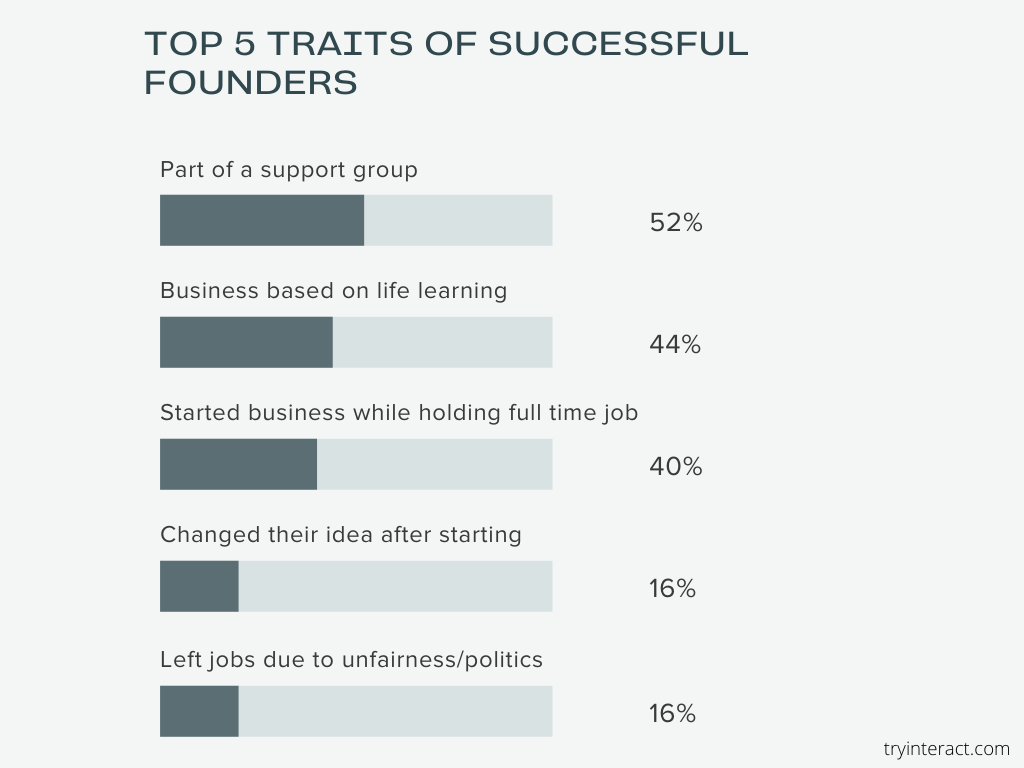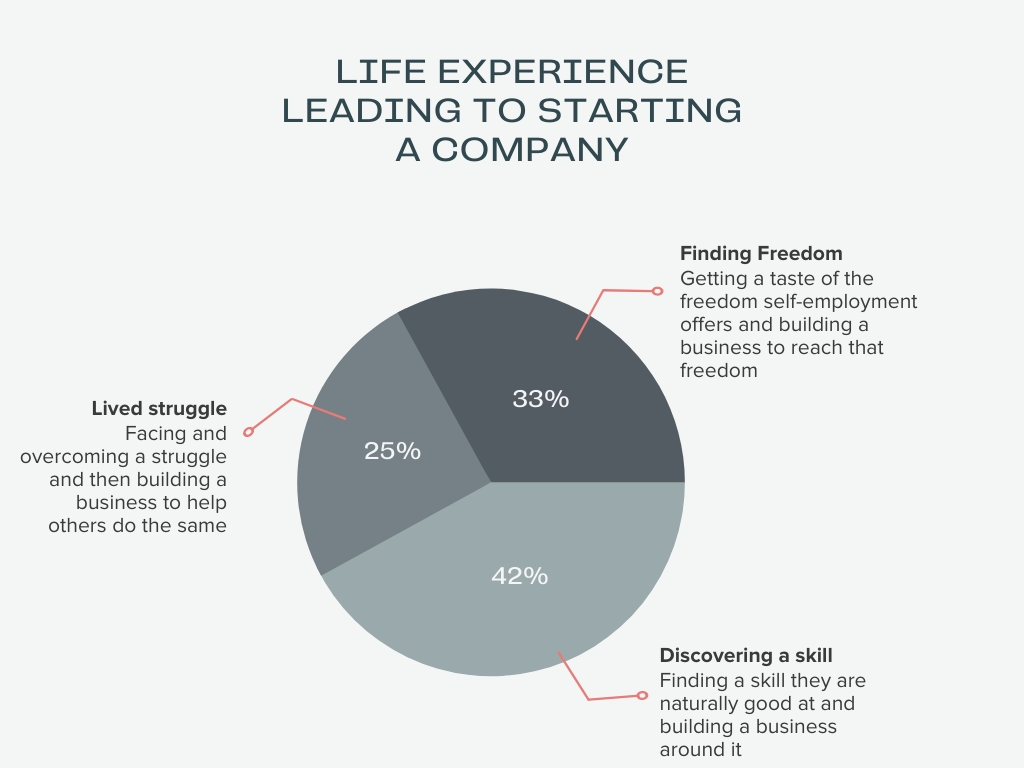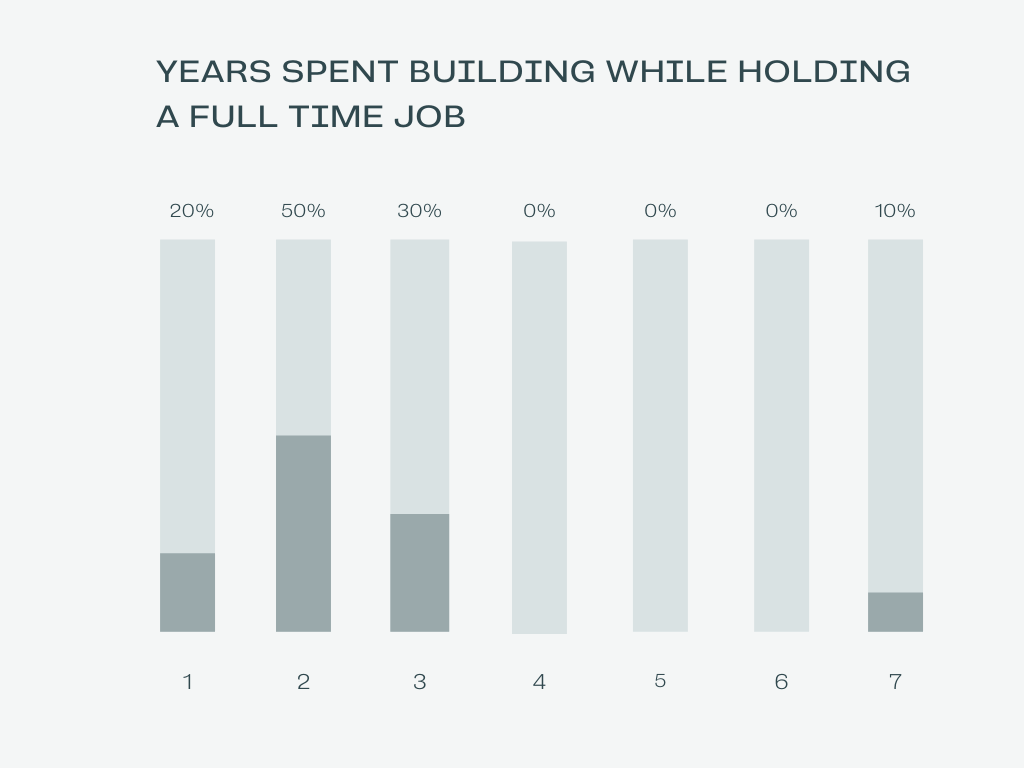There is a popular myth about founders of companies. It’s based on movies like The Social Network and every documentary about Steve Jobs’ life. The story perpetuates a stereotype that if you want to start a successful company you must be a genius who drops out of college or quits their job in some dramatic fashion, and then miraculously discovers some secret solution to an age-old problem before rocketing off into the stratosphere of success.
I was curious to find out if this is true, so I found and interviewed 25 successful founders, with success being defined purely monetarily. On average these founders are earning 3.43x their previous incomes in full-time jobs. They have founded and are now CEO of their own companies and have full control, with 100% ownership of their companies.
Without further ado, here are the top 5 common traits amongst the group that might surprise you.

The first thing that really surprised me was that there really isn’t a ton of commonality amongst the group. I thought I’d find everyone had a story that mirrored the moves and they would have dramatically quit their jobs and then built a company in their garage. But nothing could have been further from the truth. A lot of them started on the side (40%) and none of them had a crazy story of betrayal and stuff like the movies show.
But there were some traits that kept showing up, let’s dive in.
52% are part of a support group.

The one thing more than 50% of founders cited in their experience was being part of a support group. These are often called masterminds or communities in the world of entrepreneurship. But the definition most people gave for what these groups are is a peer support network, typically 4-10 people, led by a coach who is a proven founder, meaning they’ve started a company that is at least a few steps ahead of where the founder is at in terms of size and growth.
As we got to chatting about these groups, a few distinct categories emerged as far as what value a support group provides.
Resilience:
When you put your work into the world, people are brutal with their feedback. Everyone has an opinion about what will work and what won’t. People criticize and pull you down, they project their own insecurities and fears onto your output. This is debilitating if it’s just you sitting alone in a room, and for many of the founders I spoke with it can be crushing to the point of not wanting to keep going with their businesses.
To illustrate, there’s a story that stands out from Matthew McConaughey’s book Greenlights, where he shares a story of walking with a monk. As they walk, Matthew is venting and pouring out all of his deepest, darkest secrets. They walk for several hours and then finally, exhausted, sit down on a bench. The monk didn’t say a word the entire time Matthew was talking, and after they sit the monk stays silent for a few seconds before uttering just two words…”Me too.” Matthew immediately broke down crying and felt a weight lifted.
This same idea is reflected by Brene Brown in her book “I Thought it was Just Me” which, as the title might suggest, is based on the premise that anything you go through and experience might feel like you’re the only one who struggles, but actually everyone feels that way.
And to take it back even further, there’s an ancient Buddhist meditation in which you sit and breath with your eyes closed. On the in-breath you breath in your fears, on the out-breath you connect with the rest of the people on the earth who share in your fear, connecting you back to everyone else.
These themes of resilience came up over and over again with the founders I spoke with. Having people who can say “Me too” when you are having a hard time, struggling, or just having an off-day normalizes the struggle and keeps your head in the game.
Social Safety Net:
A theme many founders hinted at was the idea of isolation. Their businesses were started by just them, and even if their family and friends could be supportive, they weren’t “in it” every day when it was difficult.
Social isolation has extremely detrimental effects on mental well-being and development. In a 1940’s study that would be inhumane today a researcher studied two groups of infants, one group in an orphanage where there was little to no human interaction and another with incarcerated mothers where the infants were placed in the prison with the mothers and had regular human contact with their mothers and other infants. The results were very stark.
During their second and third years of life, the children being raised by their mothers in prison walked and talked confidently and showed development comparable to that of children raised in normal family settings. But of the 26 children reared in the orphanage, only 2 could walk and manage a few words.
McGill Research
The same rings true for the founders in my study, the founders I spoke with reported that their connection with other founders and coaches put them at ease and allowed them to develop, face difficult challenges, and grow through them together.
There is also evidence that you are actually smarter when enveloped in healthy social connection. In a book called “What Happened to You” co-authored by Oprah Winfrey, she cites a research study showing that IQ drops by up to 50% when you feel ashamed or fear for your inclusion in a social group. Having a core support group outside of your business can help bring you back up to 100% by guaranteeing inclusion that’s not based on your business’s performance. It’s all too easy to start defining your worth based on the success of your company, and having a support group outside of that helps get you back on track.
There are also positive health benefits to long-term social connection like that of a support group. In Okinawa, Japan they have a practice called Moai – which is defined as: “A social support group that forms in order to provide varying support from social, financial, health, or spiritual interests” – Blue Zones.
Basically a social safety net. The result is longer, happier life. People with happy friends are 15% happier on their lives, and the women of Okinawa life an average of 8 years longer than their US counterparts. Human beings regulate each other when we are happy and healthy together, we can share in our stress and pain when things aren’t going well, and know that we will still be safe even if we aren’t succeeding according to whatever standard we aspire to.
Affirmation:
One of the founders I spoke with cited the power of positive affirmation from her coach. She said her coach encouraged her to charge higher prices for her services, and then followed that up by being there regardless of how the experiment turned out. It was a success, and she was able to command $875 for her leadership services.
Research shows that there is a difference in the types of affirmation we can seek and receive. Social media affirmation can actually have negative effects on our self-esteem and lead to depression and anxiety. “A 2015 study found that social comparison and feedback seeking by teens using social media and cellphones was linked with depressive symptoms.” – MayoClinic.
The answer to why lies in study conducted before social media back in 1991, which found this conclusion.
Accordingly, positive normative feedback is the information that one’s performance was better than that of referenced others, such as feedback indicating above-average performance. Studies suggest that such positive normative feedback – even if it is false feedback – leads to increased performance compared to negative normative feedback (i.e., indicating below-average performance; Bandura and Jourden, 1991; Wulf et al., 2010).
Frontiersin.org
Here we find that positive feedback where you say “Good job! you are really talented at this, one of the best I’ve seen.” is a powerful motivator and actually increases a person’s ability to perform. However, this is no longer the case if you can easily see that others are doing better than you, as is what happens on social media. No matter how many likes and comments you get, there is always someone else doing better right in your face. That’s why a small group that is not always telling you that others are doing better is a place where affirmation can actually have the effect of making you better.
Ideas:
The founders I spoke with talked about how a support group was also a great resource for getting ideas in their businesses. They could trust that the people in the group would give advice with properly aligned incentives because they had an actual relationship, and there was social accountability for the group. This would lead to new breakthroughs in the business as well as saving time on tools and projects.
It’s also why many of the founders would join groups at different stages of their businesses. One woman I spoke with was joining her 7th support group and was surrounded by other founders who had been in the game for a very long time. Being around people who are growing together is incredibly powerful for idea generation.
44% of them started a business to solve a problem they’d personally experienced

The second leading trait amongst the interviewees was building a business based on actual lived experience. Meaning that their life had led down a path in which building a company became something they wanted to put the work in and figure out. Three main categories emerged amongst this group.
Discovering a skill: One woman I interviewed discovered she had a knack for sales as a kid selling birdhouses on the side of the road, she managed to make real money selling these birdhouses on a not-very-busy road, and that positive feedback led her to build businesses throughout her career. This was a common thread that I’d hear over and over again, the discovery of a natural talent that would turn into a business.
Finding freedom: Another woman I spoke with realized she could work remotely (back before we all did), and she was hooked. Working on her own business allowed her the freedom she wanted in life, and that was enough to warrant building a company. Many of the interviewees shared a similar story, stumbling into the realization that you can have a life that aligns with what you value and still do work you love by building your own company.
Lived Struggle: Several people I spoke with had life-long struggles, like the person who got chronic migraines and doctors were unable to help, so she set out to unlock the problem, upon finding a solution for herself, she realized many people have issues along the same lines, so she started a wellness company.
42% of them started on the side while holding a full-time job

For me this was the most surprising trait to make the list because it’s just so contrary to the myth of the college dropout founder. The people I spoke with were refreshingly measured in their approaches to building companies. It wasn’t the daredevil, put all your eggs in one basket approach, it was much more of a “I want to eventually work for myself but I’m going to get their without ruining my life.”
The award for this one goes to Keshia White Designs, who spent 7 years building on nights and weekends before finally launching into her business full-time after a layoff. But she’s not the only one, it was a very common story to hear of people who built businesses because they wanted to, not because they had to.
This approach is really smart though, because 50% of businesses don’t make it past the 4-year mark. So if you can swing it and start your business while also having a job that pays the bills you can de-risk yourself, learn a lot along the way, and get the best of both worlds. Of course easier said than done, and the founders who did this were incredible at time-management and partitioning their energy to make space for their endeavors.
16% changed their idea after launching
This one didn’t come up as often but it’s worth mentioning because it goes against the notion that founders of companies have some sort of existential vision and then go after it with vigor. That was not true of the people I spoke with, and in some cases people would start a blog writing about their lives or interests, then take some element of that blog and turn it into a business.
While those people are quasi-embarrassed about some of their earlier ideas, it also exposed them to a world where they could build something of their own and developed a certain confidence to go forward and create more things.
16% left previous jobs due to favoritism/politics
Another small percentage, but the stories I heard here were of unfairness in corporate settings. One woman had been working in a job where she was underpaid for five years, waiting her turn to get promoted. When it was time for her promotion, she was overlooked in favor of someone else who was promoted for internal political reasons.
Shortly after that she decided to leave and start her own business where she’s able to command $875 per session for leadership coaching services. Unfairness was sprinkled throughout the interviews I conducted, and was often part of the story even if not the primary driver.
Bonus:
One bonus trait I thought to be fascinating was that two people out of the study had started businesses simply because they weren’t able to do other work. One person moved around a lot because of a military partner, the other was living in a country where they couldn’t get a work permit so they built an online company.
This is so contrary to all the models I had in my head of founders who were full of charisma and “had to” bring their ideas into the world. These people built businesses just because they wanted to work and had ideas to bring to life, so they did. It wasn’t necessarily their first choice.
In conclusion: This study was eye-opening, there is such a pervasive avatar put out their about who has the ability to start companies, and from this set of participants that avatar could not be further from the truth. There are however, commonalities amongst people who start successful companies, but those commonalities have much more to do with the “why” and the “how” of their companies, rather than who the individuals are.